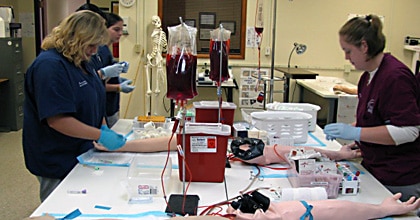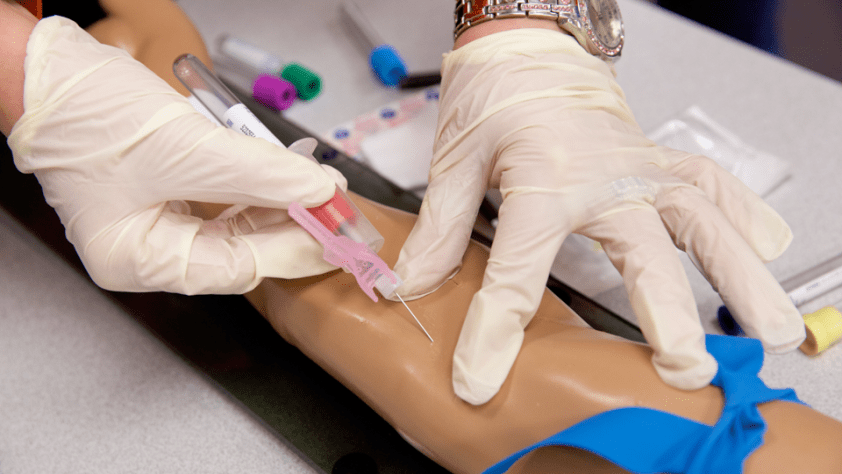The Course to Qualification: Understanding the Phlebotomy Educating Program Trip and Its Value
As you take into consideration the course to qualification in phlebotomy, it is necessary to comprehend the role you'll play in medical care. Your training will cover vital abilities, from blood collection strategies to patient interaction. Each element of the program prepares you for the obstacles ahead. What exactly does the journey require, and why is accreditation so vital for your future profession? Allow's discover these questions better.

The Function of Phlebotomists in Health Care
Phlebotomists play an essential role in the medical care system, working as the important web link between patients and important diagnostic testing. You'll do blood draws, making sure samples are gathered accurately and securely. Your expertise assists in detecting clinical conditions, checking wellness, and leading treatment decisions.
In your day-to-day interactions, you'll need to develop trust with patients, making them feel comfortable throughout what may be a difficult experience. You are in charge of labeling and taking care of examples carefully to stop contamination or errors, which might affect test outcomes.
Yet, you'll usually function alongside physicians and registered nurses, connecting important info concerning patients' conditions. Your function is basic in maintaining the operations in health care settings, making sure timely and exact results. By understanding your skills, you add meaningfully to client treatment, making you an indispensable component of the clinical group. Embracing this duty is vital to your success as a phlebotomist.
Overview of Phlebotomy Training Programs
When exploring phlebotomy training programs, you'll locate various types designed to fit different schedules and learning designs. Each program aids you establish necessary abilities like blood collection and individual interaction. Understanding these choices is crucial to picking the ideal course for your occupation.
Sorts Of Training Programs
A number of kinds of training programs are readily available for those looking to end up being proficient in phlebotomy. Furthermore, some hospitals and clinics supply on-the-job training programs, supplying useful experience while you learn. Whatever path you pick, each program intends to furnish you with the needed skills for a successful phlebotomy career.

Key Skills Established
Mastering phlebotomy calls for a collection of essential skills that are established via extensive training programs. You'll find out technical abilities like appropriate capillary selection, needle insertion, and blood collection strategies. These hands-on practices assure you can carry out procedures safely and successfully. Additionally, communication skills are basic; you'll require to communicate with clients, describe procedures, and put them secure. Recognizing composition and physiology is crucial, as well, as it aids you find veins and understand the body's response to blood draws. Lastly, you'll obtain expertise of safety and security procedures and infection control, ensuring you keep a sterilized atmosphere. Each of these skills is vital for your success as a licensed phlebotomist, making you a beneficial asset in any medical care setting.
Key Parts of a Phlebotomy Training Course
In a phlebotomy program, you'll concentrate on necessary subjects that prepared for your future job. You'll take part in hands-on training that allows you to apply what you have actually learned in real-world setups. Both the core curriculum and functional experience are vital for your success as a phlebotomist.
Curriculum Summary
While pursuing a phlebotomy training program, you'll come across a core curriculum created to outfit you with essential abilities and understanding. Phlebotomy Courses Near Me. This educational program typically consists of anatomy and physiology, concentrating on the circulatory system and recognizing blood elements. You'll also find out about various types of blood collection techniques, including venipuncture and capillary puncture techniques
Additionally, infection control and security procedures are essential parts, guaranteeing you know just how to keep a clean and sterile environment. You'll examine patient interaction, stressing communication and empathy, which are essential for alleviating patient anxiety.
Hands-On Training Experience
Getting hands-on experience is a crucial component of your phlebotomy training course. useful link This sensible training allows you to apply what you've discovered in a real-world setting, enhancing your abilities and self-confidence. You'll practice venipuncture methods, discover just how to take care of various kinds of specimens, and obtain aware of the equipment made use of in the area. Under the advice of skilled trainers, you'll fine-tune your skills, ensuring you're prepared for any type of circumstance you may encounter.
Furthermore, you'll get the opportunity to engage with people, which is vital for creating your interaction abilities. This mix of technical effectiveness and interpersonal abilities is crucial for your success as a qualified phlebotomist. Inevitably, hands-on training is where theory meets method, solidifying your understanding and readiness for certification.
Qualification and Licensing Demands
Before you can begin your profession in phlebotomy, it is crucial to comprehend the certification go and licensing demands that differ by state. Many states require phlebotomists to hold a certification from an identified organization, such as the National Phlebotomy Association or the American Society for Clinical Pathology. These certifications typically involve passing an exam that checks your expertise and abilities in the area.
In enhancement to certification, some states have certain licensing requirements. You may require to complete a certain variety of hours in medical technique, submit proof of training, or undertake a background check. It is essential to research your state's guidelines to ensure you fulfill all needed criteria.
Remaining notified concerning these needs not only aids you safeguard a setting yet additionally enhances your integrity as an expert. By satisfying these needs, you'll be well on your way to an effective profession in phlebotomy.
Hands-On Training and Practical Experience
Hands-on training and practical experience are important components of your phlebotomy education, as they enable you to use academic knowledge in real-world situations. During your training, you'll participate in supervised venipuncture, learn proper techniques, and become aware of numerous blood collection tools. This direct involvement is essential for building your self-confidence and sharpening your skills.
You'll function closely with experienced specialists who can direct you via the nuances of individual interaction and sample handling. Each session not only enhances your understanding however also prepares you for the hectic environment of health care setups.
In addition, lots of programs include clinical rotations, permitting you to experience varied settings, from health centers to outpatient centers. This direct exposure helps you adapt to various obstacles and individual requirements, ensuring you're well-prepared for your future role. Accept these chances, as they're vital to coming to be a proficient and compassionate phlebotomist.
Obstacles Dealt With Throughout Training
While gaining hands-on experience is see post crucial, it is very important to identify the challenges that can develop during your phlebotomy training. You could run into stress and anxiety when carrying out procedures on genuine patients, especially if you're brand-new to the environment. The stress to obtain everything right can be overwhelming. Furthermore, understanding the abilities required for blood attracts takes method; you might battle with method at first.
Time management can also be an obstacle, as balancing theory, useful sessions, and individual dedications can feel daunting. You may deal with varying discovering speeds amongst your peers, resulting in sensations of insecurity if you believe you're falling back. Ultimately, adjusting to the various individualities of teachers can be challenging, as each might have an one-of-a-kind training design.
Identifying these obstacles beforehand can prepare you for success and help you develop strength throughout your training journey.
Career Opportunities After Certification

As you obtain experience, you could even consider focusing on areas like pediatric or geriatric phlebotomy, providing to details person demands. Some phlebotomists pick to progress their professions by ending up being lab service technicians or going after more education and learning in healthcare fields.
Furthermore, your accreditation can bring about duties in training or overseeing new phlebotomists, enabling you to share your knowledge. With the medical care sector continuously growing, your skills will constantly remain in demand, leading the means for a secure and satisfying profession. Accept the opportunities awaiting you!
Regularly Asked Concerns
What Is the Normal Period of a Phlebotomy Training Course?
Phlebotomy training courses normally last around four to 8 weeks. You'll engage in hands-on method, classroom guideline, and online learning. Completing this training prepares you for qualification and a rewarding profession in health care.
Are Online Phlebotomy Courses Available?
Yes, online phlebotomy programs are readily available. They offer flexibility and benefit, permitting you to study at your own rate. Simply verify the program is approved to meet qualification requirements and gain valuable abilities for your job.
Just How Much Does Phlebotomy Training Commonly Expense?
Phlebotomy training generally sets you back between $700 and $2,500, relying on the program and location. You need to take into consideration variables like course length, included products, and hands-on experience when choosing the appropriate training for you.
What Prevail Requirements for Phlebotomy Training?
Typical requirements for phlebotomy training commonly consist of a high school diploma or GED, booster shots, and a background check. Some programs may also call for standard healthcare knowledge or certifications, guaranteeing you're gotten ready for hands-on training.
Can I Work While Finishing My Phlebotomy Training?
Yes, you can work while completing your phlebotomy training. Lots of trainees balance jobs with their research studies, however make specific to handle your time properly to ensure you fulfill both work and training dedications successfully.